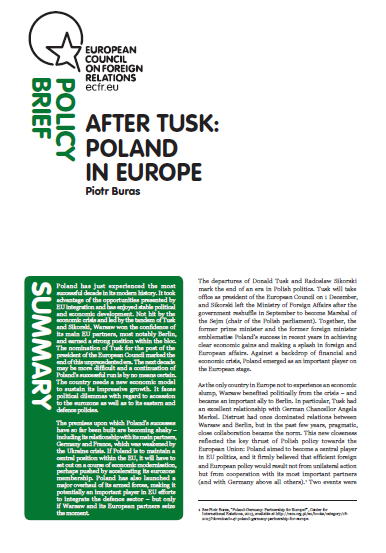After Tusk: Poland in Europe
Poland needs to reassert itself in Europe
The Ukraine crisis has revealed the limits of Poland’s foreign policy and Warsaw must now adjust its relationship with European partners to suit new political and economic challenges, according to this policy brief. It suggests that the departure of Prime Minister Donald Tusk for the European Council Presidency and Radoslaw Sikorski’s move from the foreign affairs portfolio, mark the end of a successful decade but leave unresolved issues over Poland’s future in the EU. The next decade may be more difficult and the country needs a new economic model to sustain its impressive growth. It faces political dilemmas with regard to accession to the eurozone as well as to its eastern and defence policies. The central assumptions upon which Poland’s successes have been built are becoming questionable – including its relationship with its main partners, Germany and France, which was weakened by the Ukraine crisis.
Piotr Buras recommends that Poland needs to find a new impetus in its Eastern Neighbourhood policy. Despite a significant contribution in the early stages of the Ukraine crisis, Radoslaw Sikorski’s departure as Foreign Minister has raised doubts about Poland’s continued role as Ukraine’s main advocate in the EU. At the end of 2014 Poland finds itself alienated because:
· Warsaw was not invited to join the talks which led to the unstable ceasefire at the beginning of September 2014.
· Kiev now looks to Berlin rather than Warsaw as the EU leader on the Ukraine crisis and Poland needs to find “a way back to the table”.
· Poland received no support on Ukraine from other Visegrad countries because of the diverse positions of Hungary, Slovakia and the Czech Republic.
· Despite NATO’s decision to increase forces at Szczecin, Poland believes NATO has not given Russia a clear or strong enough response over Ukraine.
Poland’s modernisation of its armed forces makes it an attractive market for European defence companies and important in EU efforts to integrate the defence sector.Piotr Buras says the current geopolitical turbulence may strengthen a Polish tendency towards self-reliance and may bolster a return to Atlanticism in defence policy. Poland was the only country in Europe not to experience an economic slump but this brief says reform of Poland’s economic and fiscal policy is essential. It examines the economic opportunities and threats facing the country in its second decade of EU membership:
· Poland’s economic success for the first decade was driven in large part by EU financial support and efficiency rather than technological innovation.
· Stricter EU climate change policies will make Poland’s coal-dependent industries a liability but they could also act as a driver for modernisation.
· The German economy, whose success has benefited Poland, is now slowing down.
· Over half of Polish foreign trade is within the Eurozone. Acceleration of the introduction of the Euro to Poland could prompt the reforms required to boost economic growth.
The European Council on Foreign Relations does not take collective positions. ECFR publications only represent the views of their individual authors.



